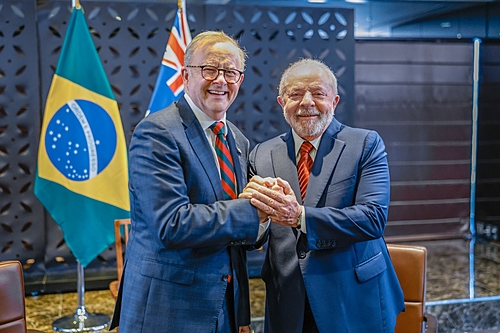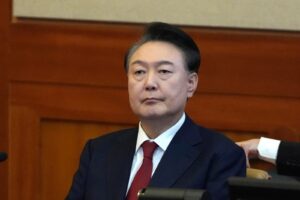
President Luiz Inácio Lula da Silva (PT) met this Friday (19) with the Prime Minister of Australia, Anthony Albanese. It was the first bilateral meeting of the Brazilian during the Extended Summit of the G7, a group that brings together seven of the ten main economies in the world, which takes place in Hiroshima, Japan.
In a half-hour conversation, the Brazilian president emphasized the importance of thinking about how to promote new relations between capital and work, including to avoid the precariousness generated by new technologies and strengthen unions, “as was the case with the labor reform in Spain” .
:: Labor counter-reform creates jobs in Spain and can be an example for Brazil ::
The Brazilian president mentioned the fact that Spain had guaranteed labor rights to app workers, and declared an interest in reducing job instability, as did Australia, according to the CNN Brazil. The two leaders also discussed opening up the algorithms to the app worker so that they have more clarity about their assessments.
In early 2022, Spain approved a labor counter-reform, reversing decades of flexibility and returning to strengthen the role of unions, the importance of collective bargaining and the prioritization of open-ended employment contracts. The model adopted by Spain until then served as an example for the reform approved in Brazil in 2017, during the government of Michel Temer, which made legislation more flexible, reduced the role of collective bargaining and facilitated temporary hiring, among other points.
Lula was elected for his third presidential term promising to review this reform, following the example of Spain. Albanese, like the Brazilian president, has a labor background. He joined the Australian Labor Party as a teenager and has led it since 2019.
:: Lula’s promise, labor counter-reform must be sliced to advance in Congress ::
“Since 2018 there has been no meeting between our countries,” tweeted Lula. “We talked about expanding Brazil-Australia relations, the Women’s Football World Cup — which Australia will host in partnership with New Zealand, in July — and I received an invitation to visit Australia. our countries”.
Through the same social network, Albaneze said that it was “wonderful” to meet Lula for the first time and to be able to salute him for the Brazilian presidency of the G20, the group of the 20 largest economies in the world, which will start in December this year.
During the meeting, Lula highlighted to the Australian premier the resurgence of Brazil in international relations in his third term, along with the resumption of social policies and infrastructure works to resume economic growth.
The president also made it clear that one of his priorities is to reinforce the protection of the environment and biodiversity. Albanese highlighted the importance of Lula’s election in 2022, especially in relation to the environmental issue.
:: Ibama denies license for oil exploration in the mouth of the Amazon basin ::
Brazil – Australia
An important component in bilateral relations is the intense interest of young Brazilians in studying in Australia. According to the latest Australian Education census, with data from 2021, there were 14,600 students from Brazil in the country. Before the restrictions caused by the covid-19 pandemic, that number reached 27 thousand people, informs the advisory of the Palácio do Planalto.
In 2022, Brazil exported US$ 732 million in products to Australia and imports in the opposite direction totaled US$ 2.67 billion, a total volume of US$ 3.4 billion in business. The main products exported by Brazil were construction equipment, coffee and cellulose. Coal dominated the list of Brazilian imports, with 84% of the total volume.
Brazil – Japan
This Saturday morning (20), Friday night in Brazil, Lula participates in the second bilateral meeting, with the Prime Minister of Japan, Fumio Kishida. Lula plans to discuss with him issues such as the expansion of bilateral trade and investment flows, cooperation in the area of decarbonization and the integration of the Brazilian community in Japan, estimated at over 200,000 individuals. In 2022, bilateral trade reached US$ 11.9 billion (R$ 59 billion), with a Brazilian surplus of around US$ 1.3 billion (R$ 6.45 billion).
Lula, who participates as a guest since Brazil is not part of the G7, will have a total of three thematic work sessions and at least seven bilateral meetings in Japan.
:: Lula arrives in Japan for an intense agenda in defense of multilateralism ::
Editing: Nicolau Soares
Source: www.brasildefato.com.br

